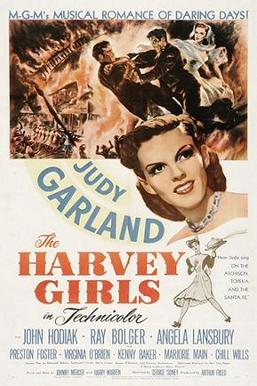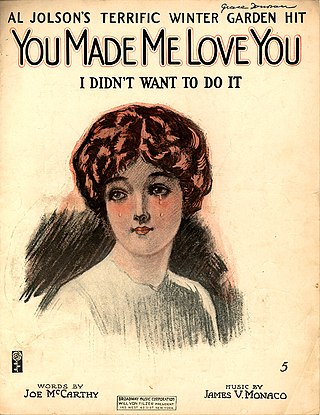Related Research Articles

The Harvey Girls is a 1946 Technicolor American musical film produced by Arthur Freed for Metro-Goldwyn-Mayer. It is based on the 1942 novel of the same name by Samuel Hopkins Adams, about Fred Harvey's Harvey House waitresses. Directed by George Sidney, the film stars Judy Garland and features John Hodiak, Ray Bolger, and Angela Lansbury, as well as Preston Foster, Virginia O'Brien, Kenny Baker, Marjorie Main and Chill Wills. Future star Cyd Charisse appears in her first speaking role on film.
"In the Cool, Cool, Cool of the Evening" is a popular song with music by Hoagy Carmichael and lyrics by Johnny Mercer. It was originally planned to feature it in a Paramount film written for Betty Hutton that never took off, which was to be called The Mack Sennett Girl. The song was buried in Paramount's files until it was rediscovered and then used in the 1951 film Here Comes the Groom and won the Academy Award for Best Original Song.
"Blues in the Night" is a popular blues song which has become a pop standard and is generally considered to be part of the Great American Songbook. The music was written by Harold Arlen, the lyrics by Johnny Mercer, for a 1941 film begun with the working title Hot Nocturne, but finally released as Blues in the Night. The song is sung in the film by William Gillespie.

"That Old Black Magic" is a 1942 popular song written by Harold Arlen (music), with the lyrics by Johnny Mercer. They wrote it for the 1942 film Star Spangled Rhythm, when it was sung by Johnny Johnston and danced by Vera Zorina. The song was nominated for the Academy Award for Best Original Song in 1943 but lost out to "You'll Never Know".
"Long Ago (and Far Away)" is a popular song with music by Jerome Kern, and lyrics about nostalgia by Ira Gershwin from the 1944 Technicolor film musical Cover Girl starring Rita Hayworth and Gene Kelly and released by Columbia Pictures. The song was nominated for the Academy Award for Best Original Song in 1944 but lost out to “Swinging on a Star”, from Going My Way. The song was published in 1944 and sold over 600,000 copies in sheet music in a year. In 2004 it finished #92 in AFI's 100 Years...100 Songs survey of top tunes in American cinema.
"Ac-Cent-Tchu-Ate the Positive" is a popular song which was published in 1944. The music was written by Harold Arlen and the lyrics by Johnny Mercer. The song was nominated for the Academy Award for Best Original Song at the 18th Academy Awards in 1945 after being used in the film Here Come the Waves.
"My Dreams Are Getting Better All the Time" is a 1945 popular song.
"Green Eyes" is a popular song, originally written in Spanish under the title "Aquellos Ojos Verdes" by Adolfo Utrera and Nilo Menéndez in 1929. The English translation was made by Eddie Rivera and Eddie Woods in 1931.
"Nevertheless I'm in Love with You" is a popular song written by Harry Ruby with lyrics by Bert Kalmar, first published in 1931. The song was a hit for Jack Denny in 1931, and was revisited in 1950 by The Mills Brothers, Paul Weston, Ray Anthony, Ralph Flanagan, Frankie Laine and Frank Sinatra, with perhaps the most compelling version being that of the McGuire Sisters.
"Pennies from Heaven" is a 1936 American popular song with music by Arthur Johnston and lyrics by Johnny Burke. It was introduced by Bing Crosby with Georgie Stoll and his Orchestra in the 1936 film of the same name.
"Imagination" is a popular song with music written by Jimmy Van Heusen and the lyrics by Johnny Burke. The song was first published in 1940. The two best-selling versions were recorded by the orchestras of Glenn Miller and Tommy Dorsey in 1940.

"You Made Me Love You (I Didn't Want to Do It)" is a popular song from 1913 composed by James V. Monaco with lyrics by Joseph McCarthy. It was introduced by Al Jolson in the Broadway revue The Honeymoon Express (1913), and used in the 1973 revival of the musical Irene.
"Sunday, Monday or Always" is a 1943 popular song with music by Jimmy Van Heusen and lyrics by Johnny Burke.
"I Can't Begin to Tell You" is a popular song with music written by James V. Monaco and lyrics by Mack Gordon. The song was published in 1945.
"I Cried for You" is a pop and jazz standard with music written by Gus Arnheim and Abe Lyman, with lyrics by Arthur Freed. It was introduced by Abe Lyman and His Orchestra in 1923. The recording by Benny Krueger and His Orchestra the same year peaked at number 2 for two weeks and remained in the charts for ten weeks at large. Also in 1923 another interpretation of the song by the Columbians reached number 14 for one week. 15 years later in 1938 two new recordings peaked both number 13 in the Billboard charts, Bunny Berigan and His Orchestra with Kathleen Lane on vocals and an interpretation by Bing Crosby. Glen Gray and his Casa Loma Orchestra followed the next year, peaking at number 6, and in 1942 Harry James' recording was the last to get into the Billboard charts, peaking at number 19.

Judy Garland signed her first recording contract at age 13 with Decca Records in late 1935. Garland began recording albums for Capitol Records in the 1950s. Her greatest success, Judy at Carnegie Hall (1961), was listed for 73 weeks on the Billboard 200 chart, was certified Gold, and took home five Grammy Awards.

"You Must Have Been a Beautiful Baby" is a popular song with music by Harry Warren and lyrics by Johnny Mercer, written in 1938 for the Warner Brothers movie Hard to Get, released November 1938, in which it was sung by Dick Powell.
"Among My Souvenirs" is a 1927 song with words by Edgar Leslie and music by Horatio Nicholls.

Bing Crosby Sings with Judy Garland, Mary Martin, Johnny Mercer is a Decca Records compilation album of phonograph records by Bing Crosby, Judy Garland, Mary Martin and Johnny Mercer.

"Robins and Roses" is a 1936 song with music by Joe Burke, and lyrics by Edgar Leslie.
References
- 1 2 3 Roberts, David (2006). British Hit Singles & Albums (19th ed.). London: Guinness World Records Limited. p. 134. ISBN 1-904994-10-5.
- 1 2 "Pop Chronicles 1940s Program #1". 1972.
- 1 2 "Music USA #7881-A, Interview with Johnny Mercer". July 28, 1976.
- 1 2 3 4 Whitburn, Joel (1973). Top Pop Records 1940-1955. Record Research.
- ↑ "A Bing Crosby Discography". BING magazine. International Club Crosby. Retrieved September 9, 2017.
- ↑ Archived at Ghostarchive and the Wayback Machine : "August 8, 1987 - Opening Ceremonies for the 10th Pan American Games at Indianapolis". YouTube .